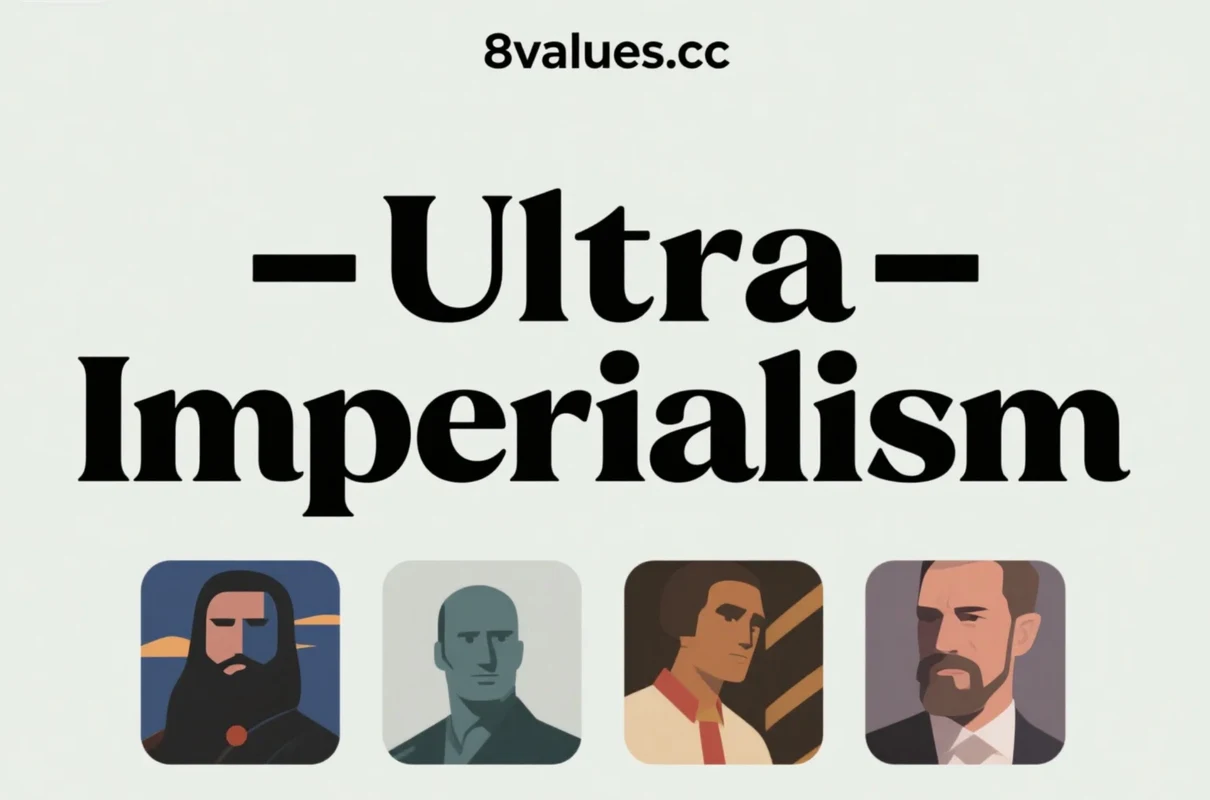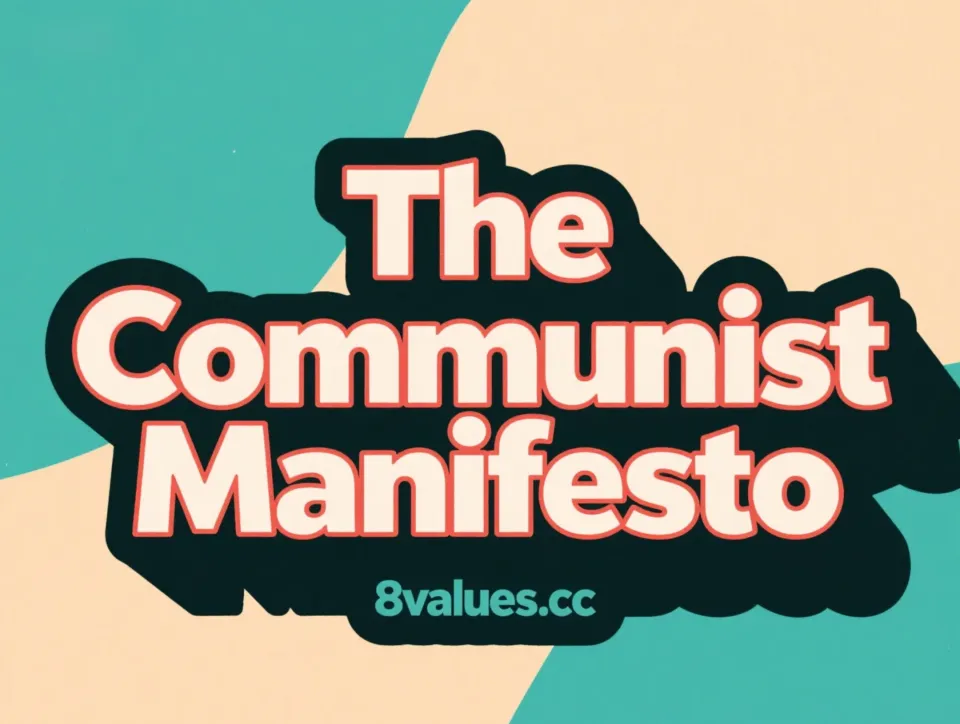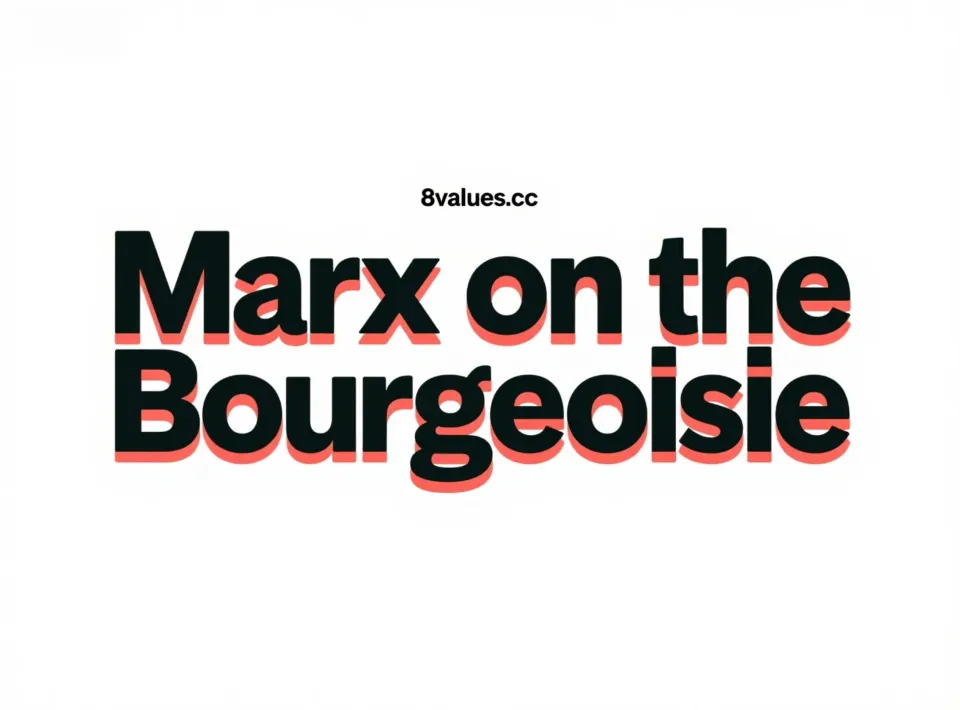Ultra-imperialism | 8values Interpretation of ideological ideology in political tests
A thorough interpretation of Karl Kautsky's "super imperialist" theory, exploring his vision of future peaceful cooperation in capitalism, and Lenin's sharp criticism of its opportunistic nature. This article will also analyze the ongoing impact of this political idea in the context of contemporary international relations and globalization, and combines 8 values political tests to help you understand its position and significance in the political spectrum.
Among the numerous ideological results of the 8 values political test , "Ultra-imperialism" as a unique and controversial political idea often triggers people's thinking. This concept was first proposed by the famous Marxist theorist Karl Kautsky in 1914, aiming to predict the next stage of capitalist development. Kautsky's vision, and the subsequent fierce criticism of VI Lenin , together formed the core of Marxism's debate on the future of imperialism in the early 20th century. Understanding "super imperialism" not only helps us to explore historical political and economic debates, but also provides us with a unique perspective for analyzing the current international landscape.
The core concept of hyper-imperialism: the outlook from free trade to international cooperation
In his article "Imperialism", written in 1914 and published in the magazine Die Neue Zeit, Carl Kautsky systematically elaborated on his "super imperialism" theory for the first time. Kautsky believes that imperialism is not the ultimate dying stage of capitalism, but a foreign economic expansion policy adopted by financial capital to obtain excess profits. He predicted that with the continuous development of monopoly capitalism, fierce competition and arms race between countries will become increasingly unbearable, and will even "dig your own grave."
Kautsky proposed on this basis that capitalism is entirely possible to enter a new stage of relatively peaceful-super imperialism . He believes that just as large corporations restrict internal competition through cartels, major imperialist countries may also form an international alliance or federation of the most powerful nations after the bitter lessons of the World War. In this "super imperialist" stage, financial capitals of various countries will no longer fight each other, but will jointly exploit the world through international alliances. This cooperation will eliminate conflicts, arms races and wars among imperialist countries, thus opening up a new era of lasting peace .
Kautsky believes that there is a significant difference between super-imperialism and traditional imperialism. Traditional imperialism is characterized by protectionism and expansion through force, such as the British attempt to transform the world into an agricultural market for its industrial products through free trade. Super imperialism is marked by stronger free trade and growing mutual penetration and concentration of capital, but is no longer accompanied by military conflicts between countries. Nevertheless, both have the structural characteristics of monopoly capitalism.
It is worth mentioning that Kautsky's idea is not completely without precedent. In 1902, the British social liberal John A. Hobson proposed the concept of "inter-imperialism" and believed that the great powers could achieve cooperation through the cartel alliance. Karl Liebknecht also proposed in 1907 that the "trustization" of colonial monopoly may occur among colonial powers, thereby eliminating colonial competition. Kautsky's theory is based on the inheritance and development of these early views.
Lenin's Severe Criticism: Opportunism and Intensification of Contradiction
Once Kautsky's theory of "super imperialism" was proposed, it was severely criticized by revolutionary Marxists represented by Vladimir Lenin. Lenin believed that Kautsky's theory was an embodiment of opportunism and petty bourgeois fantasy , which blurred the fundamental contradictions of capitalism and deviated from the revolutionary principles of Marxism.
Lenin's core criticism includes the following aspects:
Inevitability and phase of imperialism : Lenin insisted that imperialism is the highest stage and inevitable stage of capitalist development, rather than what Kautsky called "policy choice". In the book "Imperialism is the highest stage of capitalism", Lenin clearly pointed out that the essence of imperialism is monopoly capitalism , which includes the high concentration of production and capital, the rule of financial oligarchs, the importance of capital output, the division of the world by international monopoly alliances, and the division of world territory by the largest capitalist countries. These are the manifestations of the inherent laws of capitalism and an irreversible historical process.
The inevitability of war : Lenin emphasized that the imbalance in the political and economic development of capitalism is an absolute law. Therefore, war was inevitable in order to re-dividate the world market, compete for colonies, spheres of influence and hegemony. He believes that even if a temporary alliance can be formed between imperialist countries, it will be "only a 'resplash' between the two wars before and after", and that a new imbalance will sooner or later break this peace.
The dominance and contradictions of financial capital : Lenin criticized Kautsky for failing to fully recognize the decisive role of financial capital in the imperialist stage and how it intensified rather than eased imbalances and contradictions in the world economy. He pointed out that the dominance of financial capital will lead to parasiticity and decay, and will make the internal contradictions of capitalism increasingly sharp, which will ultimately lead to the "necessary explosion" of capitalism and the transformation to its opposite (socialism).
The essence of opportunism : Lenin believes that Kautsky proposed "super imperialism" to cover up and soften the fundamental contradictions of capitalism , thereby defending the bourgeois war and weakening the will to fight the proletarian revolution. He accused Kautsky of leaving the "sharp tasks" that are happening in real life and turning to dream of the "soft tasks" of the future, an attitude of being outright revisionist.
Lenin believes that Kautsky's theory is a misinterpretation of Marxist dialectics because it ignores the dynamic relationship between competition and monopoly that transforms and intensifies each other. Although monopoly arises, competition never stops and permeates all aspects of capitalist society and economic life.
Contemporary Echoes of Super Imperialism: Globalization and New Interpretations after the Cold War
Despite Lenin's severe criticism of the theory of transimperialism, Kautsky's vision was not completely abandoned by history. In the second half of the 20th century, especially after the end of World War II, the theory was reexamined by scholars as the world pattern evolved.
Post-war cooperation and US hegemony
In the decades after World War II, the colonial system collapsed, and no major military conflicts occurred between major capitalist countries, such as the United States and Europe. Instead, under the leadership of American hegemony , they formed a series of cooperation mechanisms, such as the European Union (EU), the North Atlantic Treaty Organization (NATO), and the G7 (G7). Some scholars believe that this situation of international cooperation and integration seems to confirm Kautsky's prediction to some extent. Scholars such as Giovanni Arrighi and Robert Keohane have mentioned that in the post-World War II world order, there are similarities with Kautsky's view.
Transnational capitalist class and global integration
More recent interpretations link "super imperialism" with the Transnational Capitalist Class (TCC) in the era of globalization. This view holds that hyperimperialism is not simply an agreement between states, but more likely the result of the evolution of capitalist relations, that is, the transnational capitalist class seeks accumulation and stability globally and transcends narrow national identities . These transnational capitalists coordinate global production and trade through complex global value chains and operational networks, and their interests are closely linked to the integration of global capitalism.
In this new "super empire" structure, the United States is often seen as the "core of the core" and plays the role of the leader. However, this seemingly cooperative system is also full of internal contradictions, such as uneven distribution of global accumulated benefits, unequal integration of developing countries, and the resulting dependence, and may even trigger a rebound in nationalism, such as Donald Trump's "America First" policy.
Multipolar world and ongoing debate
In the contemporary context, some leftists use the "multipolarity" to describe the tendency of weakening influence in the United States and NATO, and hope that this will lead to a more peaceful and stable capitalist world. However, critics (such as the Socialism For All channel) argue that this optimistic interpretation of the “multipolar world” is exactly the same as Kautsky’s hyper-imperialist theory and may still lead to conflicts within capitalism rather than real class struggle or socialist revolution.
Despite constant controversy, Kautsky's super-imperialist theory still provides an important analytical framework for contemporary international relations research. It helps us understand international integration projects, relationships between core countries, and theoretical debates between neoliberalism and neorealism. For the social democratic movement that pursues progressive reform, transimperialism provides a view of international relations that distinguishes itself from Leninist imperialism, emphasizing the importance of cooperation rather than conflict.
The significance of hyper-imperialism in the 8 values political test
In the 8values political test , if you get an ideological result of "super imperialism", this usually means you tend to:
- Global cooperation in the economic field : I believe that through the alliance of international financial capital and global cartelization, the global economy can be effectively managed, and the optimal allocation of resources and sustainable growth can be achieved.
- Peace Outlook on International Relations : It is believed that conflicts, arms races and wars between imperialist countries are not inevitable, and can be resolved through rational consultation and the formation of international alliances to achieve lasting international peace.
- Adaptation and evolution of capitalism : It tends to believe that capitalism has strong self-adjustment and evolution capabilities, and can overcome its inherent crises through internal reform and international cooperation and enter a more advanced and stable stage of development.
This position in the political spectrum may be manifested as a high degree of affirmation on issues of globalization and international cooperation, while in fundamental changes to the capitalist system, it may tend to be moderate improvement rather than fierce revolution. It represents a unique understanding of the international political and economic order, emphasizing the shaping of the global future through the synergy between state and capital rather than confrontation.
Conclusion
Karl Kautsky's "super imperialism" theory is undoubtedly an important legacy in the treasure house of Marxist thought in the early 20th century. It proposes the imaginative idea that capitalism may achieve peace and stability through international cooperation. However, Lenin's criticism of his "opportunism" and "fantasy" is equally profound and powerful, revealing the intrinsic contradictions and the stubbornness of capitalism's struggle for power.
Today, with the deepening of the globalization process, the rise of multinational corporations and the strengthening of the role of international organizations, some of Kautsky's predictions seem to have been partially confirmed in reality, prompting scholars to continue to reinterpret and re-evaluate this theory. Whatever ideology you draw in the 8values political test , understanding the theoretical connotation of “super imperialism” and the profound debates it triggers will help us examine the complex challenges and development opportunities facing the contemporary world more comprehensively and critically. It reminds us that there are always many possible theoretical explanations and practical paths for the future direction of global political economy.
For more exciting content, please continue to read the 8Values official blog !






